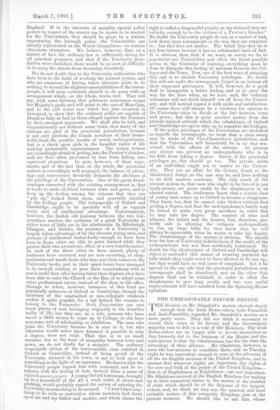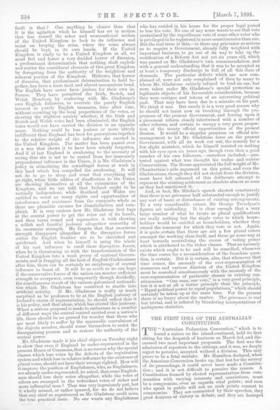THE UNSEASONABLE REFORM DEBATE.
THE division on Mr. Stansfeld's motion showed clearly enough that the Irish Home-rulers, both Paruellite and Anti-Parnellite, regarded Mr. Stansfeld's motion as a mere party move. They did not think it necessary to record their votes in its favour, and the Government majority rose to 102 on a vote of 480 Members. The Irish Home-rulers are no longer able to devote themselves as they formerly did to the business of the House, and the consequence is that the Gladstonians lose for the time the advantage of their alliance. Mr. Gladstone, however, is none the less anxious to conciliate them, and on Tuesday night he was imprudent enough to pose as the advocate of all the un-English sections of the United Kingdom, and to assume that whosever rights are important, the rights of the core and bulk of the people of the United Kingdom— that is, of Englishmen as Englishmen—are not important. Mr. Gladstone sneered at the English Members for waking up to their numerical claims in the matter of the number of seats which should be at the disposal of the largest, richest, and, we think we may say, the quietest and least excitable section of this composite Kingdom, just at the present moment, We should like to ask him, whose fault is that ? Can anything be clearer than that it is the agitation whch he himself has set in motion that has roused the sober and unsensational section of the United Kingdom to look to its influence and insist on keeping the reins, where the reins always should be kept, in its own hands. If the United Kingdom is really to be a United Kingdom at all, we must feel and foster a very decided horror of disunion, a predominant determination that nothing shall explode and scatter the constituent elements of this great Kingdom by derogating from the authority of the weightiest and soberest portion of the Kingdom. Hitherto, that horror of disunion, that predominant determination to hold to- gether, has been a mere tacit and almost unconscious bond. The English have never been jealous for their own in- fluence. They have permitted the Irish, Scotch, and Welsh Members, by coalescing with Mr. Gladstone's own English followers, to overrule the purely English interest in purely English measures, time after time, without counting up the local proportions of the votes, or showing the slightest anxiety whether, if the Irish and Scotch and Welsh votes had been eliminated, the English votes would not have carried the division in an opposite sense. Nothing could be less jealous or more utterly indifferent than England has been for generations together to the relative weight of the influence she exerted in the United Kingdom. The matter has been passed over in a way that shows it to have been utterly forgotten. And if at last England is awakening to the necessity of seeing that she is not to be ousted from her immensely preponderant influence in the Union, it is Mr. Gladstone's policy in stimulating the centrifugal forces at work in this land which has compelled the awakening. It will not do to go to sleep and trust that everything will go right, when little eddies of disaffection to the Union are showing themselves at all the extremities of the Kingdom, and we are told that Ireland ought to be virtually independent, while Scotland and Wales are entitled to wrest as many rights and opportunities of interference and resistance from the composite whole as there are plausible excuses for dissatisfaction and com- plaint. It is very curious how Mr. Gladstone first tugs at the central power to get the reins out of its hands, and then turns round and reproaches it with showing a selfish and fanciful jealousy altogether unworthy of its enormous strength. He forgets that that enormous strength disappears altogether if the disruptive forces within the English frontier are to be cherished and quickened. And when he himself is using the whole of his vast influence to swell these disruptive . forces, when he is threatening us with the transformation of the United Kingdom into a weak group of cantonal Govern- ments, and is dragging all the host of English Gladstonians after him, there can be certainly no surplusage of central influence to boast of. It will be as much as we can hope if the conservative forces of the nation can muster sufficient strength to overpower, even temporarily though decidedly, the simultaneous revolt of the various galvanised nationali- ties which Mr. Gladstone has contrived to startle into artificial activity. If Mr. Gladstone is really as much surprised as he professes to be at the English jealousy of Ireland's excess of representation, he should reflect that it is his policy, and that alone, which has stirred this jealousy. When a serious proposal is made to embarrass in a number of different ways the central control exerted over a nation's life, there should be no ground for wonder that those who are most likely to suffer by the spasmodic convulsions of the disjecta ?umbra, should rouse themselves to resist the disorganising process and to restore the authority of the central power. Mr. Gladstone made it his chief object on Tuesday night to show that even if England be under-represented in the present House of Commons, that is no reason why the special classes which lose votes by the defects of the registration system and which lose in relative influence by the existence of plural votes, should not have their wrongs righted. How will it improve the position of Englishmen, who, as Englishmen, are already under-represented, he asked, that some English- men should lose their votes altogether, while the votes of others are swamped in the redundant votes of richer and more influential men ? That was very ingeniously put, but it wholly missed, or rather ignored, for we do not believe that any chief so experienced as Mr. Gladstone could miss, the true practical issue. No one wants any Englishman who has resided in his house for the proper legal period to lose his vote. No one of any sense wants to see that vote neutralised by the superfluous vote of some other voter who is privileged to be registered in more constituencies than one. But the real issue is this,—is there any grievance so serious as to require a Government, already fully weighted with important business, to go out of its way to take up the rectification, of a Reform Act not yet six years old, which was passed on Mr. Gladstone's own recommendation, and with a general understanding that it was to be accepted as at least a temporary discharge in full of all this class of demands. The particular defects which are now com- plained of, were not only complained of then by many to whom Mr. Gladstone entirely refused to lend an ear, but were taken under Mr. Gladstone's special protection as legitimate objects of his favourable consideration, because they were vestiges and tokens of an interesting political past. That may have been due to a mistake on his part. We think it was. But surely, it is a very good reason why he should not insist now on breaking through the pro- gramme of the present Government, and forcing upon it a piecemeal reform closely intertwined with a number of other reforms, and certain to occupy a very great propor- tion of the scanty official opportunities of the present Session. It would be a singular premium on official mis- management to let Mr. Gladstone force on the present Government, with all its work cut out, the remedy for a few slight mistakes, which he himself insisted on making with his eyes open six years ago, though even then a good number of his own followers,—ourselves included,--pro- tested against what was thought his undue and unwise Conservatism. The House appreciated the full weight of Mr. Chamberlain's able argument on this point, and even the Gladstonians, though they did not shrink from the division, must have felt ashamed of this deliberate attempt to represent the existing settlement as obsolete almost as soon as they had sanctioned it. And, in fact, Mr. Ritchie's speech showed conclusively that there is no grievance half substantial enough to justify any sort of haste or disturbance of existing arrangements. To a very considerable extent, Sir George Trevelyan's figures are misleading. It is clear enough that a very large number of what he treats as plural qualifications are really nothing but the single votes to which house- holders would be entitled as householders, whether they owned the tenement for which they vote or not. Again, it is quite certain that there are not a few plural voters amongst the working class itself, and these go some way at least towards neutralising the excess of voting power which is attributed to the richer classes. That an anomaly exists which ought to be and will be remedied, whenever the time comes for a reconsideration of the franchise ques- tion, is certain. But it is certain, also, that whenever that time comes, the anomaly of the over-representation of numerous and various districts of the United Kingdom must be remedied simultaneously with the anomaly of the i over-representation of particular classes in existing con- stituencies. " One man, one vote," is a very good principle, but it is not at all a better principle than the principle, " Equal political power to equal populations," which should certainly be taken up at the same time. For the present there is no hurry about the matter. The grievance is real but trivial, and is inflated by blundering interpretations of ambiguous statistics.







































 Previous page
Previous page